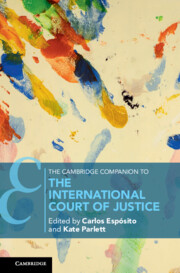Book contents
- The Cambridge Companion to the International Court of Justice
- Cambridge Companions to Law
- The Cambridge Companion to The International Court of Justice
- Copyright page
- Contents
- Contributors
- Preface
- Introduction
- Part I The Role of the ICJ
- Part II The ICJ and International Dispute Settlement
- 6 The Jurisdiction of the Court
- 7 Provisional Measures
- 8 The International Court of Justice as the Master of the Sources
- 9 Fact-Finding and Expert Evidence
- 10 The ICJ and Other Courts and Tribunals: Integration and Fragmentation
- 11 The Working Practices of the Court
- 12 Procedure in Contentious Cases: Evolution and Flexibility
- 13 Effective Advocacy at the ICJ
- Part III The Impact of the ICJ’s Jurisprudence
- Index
- References
10 - The ICJ and Other Courts and Tribunals: Integration and Fragmentation
from Part II - The ICJ and International Dispute Settlement
Published online by Cambridge University Press: 18 May 2023
- The Cambridge Companion to the International Court of Justice
- Cambridge Companions to Law
- The Cambridge Companion to The International Court of Justice
- Copyright page
- Contents
- Contributors
- Preface
- Introduction
- Part I The Role of the ICJ
- Part II The ICJ and International Dispute Settlement
- 6 The Jurisdiction of the Court
- 7 Provisional Measures
- 8 The International Court of Justice as the Master of the Sources
- 9 Fact-Finding and Expert Evidence
- 10 The ICJ and Other Courts and Tribunals: Integration and Fragmentation
- 11 The Working Practices of the Court
- 12 Procedure in Contentious Cases: Evolution and Flexibility
- 13 Effective Advocacy at the ICJ
- Part III The Impact of the ICJ’s Jurisprudence
- Index
- References
Summary
This chapter considers the ICJ’s relationship with other courts and tribunals through the dual prism of integration and fragmentation. The author argues that three factors influence the degree of the Court’s integration or fragmentation: the identity of the court, the substance of the law, and the procedures employed. The author selects three legal issues that have been considered by the ICJ and other courts and tribunals in recent years: jurisdiction over issues of immunity involving treaties that do not expressly refer to immunity; inferring specific intent for genocide; and the nature of consular assistance as a treaty obligation, individual right or human right. These issues provide insight into the way that identity, area of law and procedure influence integration or fragmentation among international courts.
Keywords
- Type
- Chapter
- Information
- The Cambridge Companion to the International Court of Justice , pp. 208 - 222Publisher: Cambridge University PressPrint publication year: 2023

